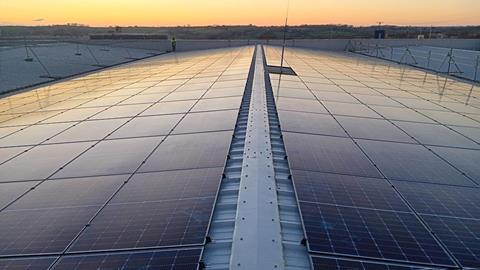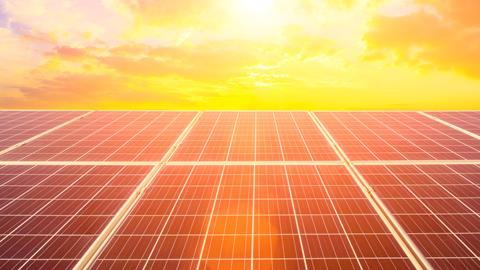With the rising impact of environmental and economic issues for supermarkets, find out how rooftop solar panels can enhance their sustainable footprint and win kudos with consumers.
Driven by rising energy costs and a growing commitment to sustainability, supermarkets are increasingly embracing solar power solutions. These rooftop arrays aren’t just generating clean energy, they’re making a real difference.
The adoption of solar energy in the food manufacturing and retail industry is expected to bring about several positive changes, impacting both environmental and economic aspects.
Environmental benefits:
- Reduced carbon footprint: replacing fossil fuel-based electricity with solar power will significantly decrease greenhouse gas (GHG) emissions from, contributing to the fight against climate change.
- Sustainable energy source: solar energy is a clean and renewable resource, helping supermarkets move away from dependence on finite fossil fuels and promoting long-term energy sustainability.
- Improved waste management: some businesses are using solar power to operate electric waste-reduction technologies like food waste compactors and recycling equipment, further reducing their environmental impact.
Economic benefits:
- Reduced energy costs: supermarkets and food manufacturing typically have high energy demands, and solar energy can provide significant cost savings on electricity bills, boosting profit margins.
- Energy independence: generating their own electricity makes supermarkets less reliant on fluctuating grid prices and potential energy shortages, offering greater stability and predictability in their energy costs.
- Enhanced brand image: consumers increasingly value sustainability, and supermarkets and food manufacturers using solar energy can project a more eco-friendly image, attracting environmentally conscious customers.

Additional benefits:
- Employee engagement: participating in sustainability initiatives can boost employee morale and engagement, fostering a positive work environment.
- Community impact: businesses can be seen as leaders in promoting renewable energy within their communities, inspiring others to adopt sustainable practices.
- As consumers increase their switch to EVs the solar-powered electric vehicle charging stations will meet the demands of modern environmentally conscious customers.
Case study: Iceland Foods
Iceland Foods, one of Britain’s fastest-growing retailers, has partnered with Ortus Energy to install electricity-generating solar arrays across its estate. The company has set a target to reduce its carbon emissions by 50% by 2030 and is on track to meet this goal.
The first phase of the project has already been completed, with a 1.125MWp solar system installed at Iceland Foods’ headquarters in Deeside. This system is forecast to deliver 962 MWh of electricity each year, saving 168 tonnes of CO2 and providing significant cost savings. When the full project is complete the power generated will offset 6,100 tonnes of CO2.
An alternative way to invest in net zero
What makes this approach to delivering solar power is the Ortus Energy Power Purchase Agreement (PPA). This package enabled Iceland Foods to make the switch to solar energy without any upfront capital expenditure.
The whole project is designed, installed, and will be maintained for the full term of the agreement, while Iceland Foods will only pay for the generated electricity that it uses.
The PPA solution is proving to be a popular way for businesses to finance solar energy projects. It allows them to benefit from the cost savings and environmental benefits of solar energy without having to make a large upfront investment.
Scaling the impact
Following the successful deployment of the first phase, Ortus and Iceland are now scheduling the rollout of solar across the food giant’s commercial estate.
“Iceland’s commitment has enabled Ortus to roll out the first phase of the project in a way that has seen clean energy, and consequent cost savings, coming online rapidly. For us this shows that once people make the commitment to utilise renewable energy that transition can come about very quickly,” Tom Van Mourik, Ortus operations director
If you would like to understand the impact an Ortus Energy PPA they have a planning tool that will enable you to clearly see the solar yield you could benefit from in your organisation.



















